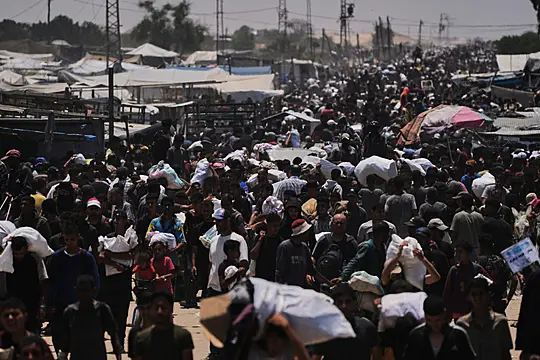The death toll in the ongoing Israel-Hamas war has surpassed 55,000 Palestinians, according to figures released by health officials in Gaza. As the conflict stretches into its ninth month, the humanitarian crisis deepens, with thousands more injured and critical infrastructure in the Gaza Strip nearly decimated.
Gaza’s Health Ministry reports that the majority of casualties are women and children, sparking growing international condemnation and urgent calls for a ceasefire. The Israeli military continues its operations across northern and southern Gaza, targeting what it describes as Hamas strongholds and tunnel networks. However, the relentless bombardments have led to unprecedented civilian losses.
Humanitarian Catastrophe Unfolds in Gaza
The situation on the ground is dire. Hospitals are overwhelmed, medical supplies are running out, and many displaced families are sheltering in overcrowded, unsanitary conditions. According to the United Nations, more than 1.9 million Gazans—over 80% of the population—have been forced to flee their homes since the conflict began in October 2024.
“Entire neighborhoods have been reduced to rubble,” said Dr. Youssef Qudra, a spokesperson for the Gaza Health Ministry. “The healthcare system is on the verge of total collapse. The world must act now to stop this humanitarian disaster.”
International aid agencies warn that without a sustained ceasefire and secure humanitarian corridors, the death toll could rise significantly in the coming weeks.
Israel Defends Military Actions Amid Global Outcry
The Israeli government maintains that its military campaign is necessary to dismantle Hamas and prevent future attacks on Israeli civilians. Officials argue that Hamas continues to operate within civilian areas, using human shields and underground infrastructure to evade detection.
“Israel has the right to defend itself,” said a statement from the Israeli Defense Forces (IDF). “Every effort is made to minimize civilian casualties, but Hamas bears full responsibility for embedding its fighters among the population.”
The war erupted after Hamas launched a surprise attack on southern Israel on October 7, 2024, killing over 1,200 Israelis and taking hundreds of hostages. In response, Israel launched a full-scale military campaign targeting the Gaza Strip.
Growing International Pressure for Ceasefire
The staggering loss of life has prompted renewed calls from world leaders for an immediate ceasefire and a return to diplomatic negotiations. The United Nations, European Union, and several Middle Eastern countries have condemned the high civilian casualties and urged both sides to de-escalate the violence.
U.S. Secretary of State Antony Blinken has been engaged in shuttle diplomacy in the region, seeking to broker a ceasefire agreement that would allow for the release of hostages and the delivery of humanitarian aid. However, peace talks have repeatedly stalled, with both Israel and Hamas standing firm on key demands.
Calls for War Crimes Investigation
Human rights organizations, including Amnesty International and Human Rights Watch, have called for independent investigations into alleged war crimes committed by both sides. These groups emphasize that the indiscriminate targeting of civilians and civilian infrastructure violates international law.
“This level of carnage cannot go unanswered,” said Agnès Callamard, Secretary General of Amnesty International. “There must be accountability, and there must be justice for the victims.”
As the Israel-Hamas war rages on, the human cost continues to climb with no clear end in sight. With more than 55,000 Palestinians killed and the humanitarian crisis worsening, the international community faces mounting pressure to intervene decisively. The path to peace remains uncertain, but the urgency of the moment is undeniable.
Swifteradio.com


